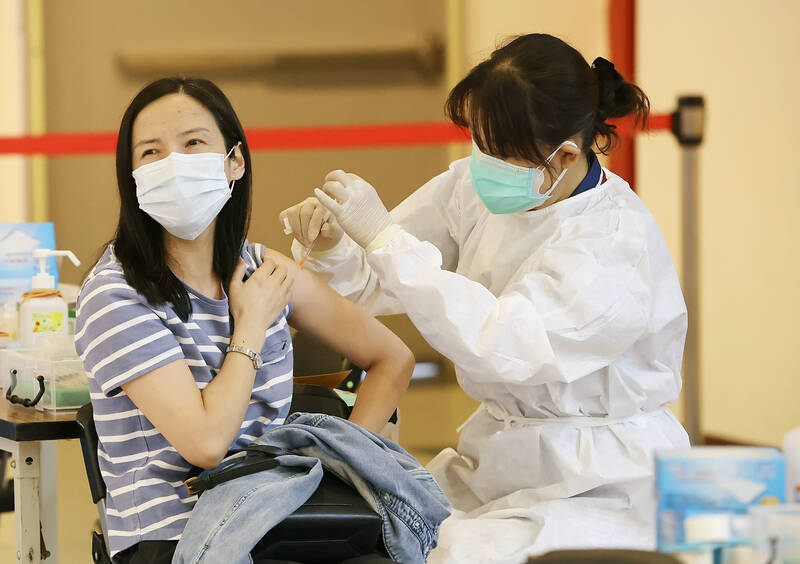Claims for COVID-19 insurance policies could drop next month as the government plans to relax one of its quarantine rules, but property insurers might still proceed with their capital injection plans, the Financial Supervisory Commission said yesterday.
The Central Epidemic Command Center (CECC) announced on Monday that from Nov. 7, caregivers of confirmed COVID-19 cases would no longer need to self-quarantine if they test negative after the confirmed case completes their seven-day quarantine period.
As many COVID-19 insurance policies have been designed to pay policyholders for being quarantined, property insurers would have fewer compensation claims following the rule change, the commission said.

Photo: CNA
Each property insurer could pay NT$1 billion or NT$2 billion (US$30.94 million or US$61.88 million) less in compensation based on the eased rule, Chinese-language news reports said.
“COVID-19 insurance is unlike accident insurance or fire insurance, the premiums of which can be adjusted based on a fixed mechanism. Whether and how property insurers should compensate policyholders of COVID-19 insurance hinges on the nation’s anti-virus regulations,” Insurance Bureau Deputy Director-General Thomas Chang (張玉煇) said.
However, it is too early to say that some property insurers would not need to implement capital injection plans to boost their finances, because the COVID-19 situation is still developing, Chang said.
Accumulated COVID-19 insurance claims grew to NT$107.18 billion as of Monday, up NT$6.4 billion from a week earlier, the commission said, adding that 2.83 million policyholders had been paid out so far, accounting for 56 percent of all people who had purchased COVID-19 insurance.
The combined net worth of all property insurers last month plunged NT$538.5 billion month-on-month to NT$828.5 billion, with combined pretax losses of NT$110.4 billion for the first nine months of the year, commission data showed.

MULTIFACETED: A task force has analyzed possible scenarios and created responses to assist domestic industries in dealing with US tariffs, the economics minister said The Executive Yuan is tomorrow to announce countermeasures to US President Donald Trump’s planned reciprocal tariffs, although the details of the plan would not be made public until Monday next week, Minister of Economic Affairs J.W. Kuo (郭智輝) said yesterday. The Cabinet established an economic and trade task force in November last year to deal with US trade and tariff related issues, Kuo told reporters outside the legislature in Taipei. The task force has been analyzing and evaluating all kinds of scenarios to identify suitable responses and determine how best to assist domestic industries in managing the effects of Trump’s tariffs, he

TIGHT-LIPPED: UMC said it had no merger plans at the moment, after Nikkei Asia reported that the firm and GlobalFoundries were considering restarting merger talks United Microelectronics Corp (UMC, 聯電), the world’s No. 4 contract chipmaker, yesterday launched a new US$5 billion 12-inch chip factory in Singapore as part of its latest effort to diversify its manufacturing footprint amid growing geopolitical risks. The new factory, adjacent to UMC’s existing Singapore fab in the Pasir Res Wafer Fab Park, is scheduled to enter volume production next year, utilizing mature 22-nanometer and 28-nanometer process technologies, UMC said in a statement. The company plans to invest US$5 billion during the first phase of the new fab, which would have an installed capacity of 30,000 12-inch wafers per month, it said. The

In a small town in Paraguay, a showdown is brewing between traditional producers of yerba mate, a bitter herbal tea popular across South America, and miners of a shinier treasure: gold. A rush for the precious metal is pitting mate growers and indigenous groups against the expanding operations of small-scale miners who, until recently, were their neighbors, not nemeses. “They [the miners] have destroyed everything... The canals, springs, swamps,” said Vidal Britez, president of the Yerba Mate Producers’ Association of the town of Paso Yobai, about 210km east of capital Asuncion. “You can see the pollution from the dead fish.

Taiwan’s official purchasing managers’ index (PMI) last month rose 0.2 percentage points to 54.2, in a second consecutive month of expansion, thanks to front-loading demand intended to avoid potential US tariff hikes, the Chung-Hua Institution for Economic Research (CIER, 中華經濟研究院) said yesterday. While short-term demand appeared robust, uncertainties rose due to US President Donald Trump’s unpredictable trade policy, CIER president Lien Hsien-ming (連賢明) told a news conference in Taipei. Taiwan’s economy this year would be characterized by high-level fluctuations and the volatility would be wilder than most expect, Lien said Demand for electronics, particularly semiconductors, continues to benefit from US technology giants’ effort